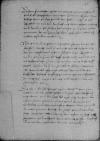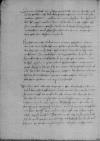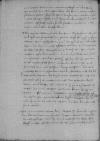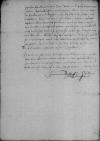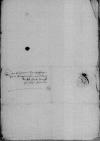Wir habenn negst E(wer) Er(barkei)t cf. Gdańsk Town Council to Ioannes DANTISCUS Gdańsk (Danzig), 1533-03-27, CIDTC IDL 4210⌊schreÿbenncf. Gdańsk Town Council to Ioannes DANTISCUS Gdańsk (Danzig), 1533-03-27, CIDTC IDL 4210⌋, an uns denn dornstagk noch letare[3] gethon, entfang(en) unnd doraus E(wer) Er(barkei)t sundere freuntlicheit unnd gutten willen vornomenn, / den wir zcwvorschuldenn geflissenn alleczeith wollenn gefundenn werdenn etc.
Wie es mit Hans Holsten (†after 1548)⌊Hans HolstennHans Holsten (†after 1548)⌋ ergangenn, / seÿ wir durch E(wer) Er(barkei)t schrifftenn bericht, / unnd ist uns nicht wenigk beschwerlich, / das inn rechtfertigenn sachenn so kleÿnn unser schreÿbenn / unnd E(wer) Er(barkei)t fleiß ann ko(nigliche)m hoffe geacht wirth, / unnd wer uns vil beschwerlicher, / so wir nicht wustenn, / wie es do beÿ hoffe zcwgeth. Mussenn dis so inn eÿne gedult stellenn. / Was uns aber hierinne Sigismund I Jagiellon (Zygmunt I) (*1467 – †1548), King of Poland and Grand Duke of Lithuania (1506-1548); Duke of Głogów (Glogau) (1499-1506), Duke of Opava (1501-1506), Governor of Silesia (1504-1506); son of King Kazimierz IV Jagiellon and Elisabeth of Austria⌊ko(niglich)e ma(ieste)tSigismund I Jagiellon (Zygmunt I) (*1467 – †1548), King of Poland and Grand Duke of Lithuania (1506-1548); Duke of Głogów (Glogau) (1499-1506), Duke of Opava (1501-1506), Governor of Silesia (1504-1506); son of King Kazimierz IV Jagiellon and Elisabeth of Austria⌋, unser allerg(nedigs)ter her / unnd der her Piotr Tomicki (*1464 – †1535), humanist, statesman, diplomat, one of the most trusted collaborators of King Sigismund I of Poland; 1500-1503 Chancellor of Cardinal Fryderyk Jagiellon, 1502 Gniezno Cantor, Archdeacon of Cracow, 1503-1505 servant of Jan Lubrański, Bishop of Poznań, 1504-1510 Canon of Poznań, 1506 royal scribe, 1507-1519 Grand(?) Secretary, 1509 Canon of Włocławek, 1510-1514 - of Gniezno, 1511 Custos in Kielce and Sandomierz, 1514 Bishop of Przemyśl; 1515 Crown Vice-Chancellor, 1520 Bishop of Poznań, 1523 - of Cracow; from 1524 (at least) General Collector of świętopietrze (Peter's pence), 1509 royal envoy to the Dukes of Pomerania and to Mecklenburg, 1510 - to Wallachia, 1510, 1511, 1512, 1513 - to Hungary (WYCZAŃSKI 1990, p. 268)⌊krokÿscher bischoffPiotr Tomicki (*1464 – †1535), humanist, statesman, diplomat, one of the most trusted collaborators of King Sigismund I of Poland; 1500-1503 Chancellor of Cardinal Fryderyk Jagiellon, 1502 Gniezno Cantor, Archdeacon of Cracow, 1503-1505 servant of Jan Lubrański, Bishop of Poznań, 1504-1510 Canon of Poznań, 1506 royal scribe, 1507-1519 Grand(?) Secretary, 1509 Canon of Włocławek, 1510-1514 - of Gniezno, 1511 Custos in Kielce and Sandomierz, 1514 Bishop of Przemyśl; 1515 Crown Vice-Chancellor, 1520 Bishop of Poznań, 1523 - of Cracow; from 1524 (at least) General Collector of świętopietrze (Peter's pence), 1509 royal envoy to the Dukes of Pomerania and to Mecklenburg, 1510 - to Wallachia, 1510, 1511, 1512, 1513 - to Hungary (WYCZAŃSKI 1990, p. 268)⌋ cf. Sigismund I Jagiellon to Ioannes DANTISCUS Cracow, 1533-03-15, CIDTC IDL 914;
Piotr TOMICKI to Ioannes DANTISCUS Cracow, 1533-03-15, CIDTC IDL 3558⌊brifflichcf. Sigismund I Jagiellon to Ioannes DANTISCUS Cracow, 1533-03-15, CIDTC IDL 914;
Piotr TOMICKI to Ioannes DANTISCUS Cracow, 1533-03-15, CIDTC IDL 3558⌋ geantwurt, / hab wir ausgeczogen inn eingelegte copeÿ, E(wer) Er(barkei)t nicht wold bergenn, / das aus zcuermessenn, / wie etc.
Das aber E(wer) Er(barkei)t sold Sigismund I Jagiellon (Zygmunt I) (*1467 – †1548), King of Poland and Grand Duke of Lithuania (1506-1548); Duke of Głogów (Glogau) (1499-1506), Duke of Opava (1501-1506), Governor of Silesia (1504-1506); son of King Kazimierz IV Jagiellon and Elisabeth of Austria⌊ko(nigliche)r maÿ(este)tSigismund I Jagiellon (Zygmunt I) (*1467 – †1548), King of Poland and Grand Duke of Lithuania (1506-1548); Duke of Głogów (Glogau) (1499-1506), Duke of Opava (1501-1506), Governor of Silesia (1504-1506); son of King Kazimierz IV Jagiellon and Elisabeth of Austria⌋, unsrem allerg(nedigs)ten hernn, seinn angebenn / wie die, / welche helffenn die freÿ she schiffarth vorhinderenn / unnd das solchs ko(niglich)e maÿ(este)t, auch die Royal Council of Poland ⌊hernn der ChronnRoyal Council of Poland ⌋ soltenn gelobenn, / ist uns gewest zuvornemenn wunderlich unnd aller vornunfft entkegenn, / dann nÿmandt, der rechter sÿnnenn braucht, / im selbst gerne die hand abslecht, derhalbenn wir written over ich⌈ich wir wir written over ich⌉ auch mith denn erstenn an hoff woll(en) schreÿbenn / unnd wold(en) wol, das E(wer) Er(barkei)t mith grosserm unglipff nu(m)mer wurdenn angetragen. / Dem wer wol zcwthun. /
 APG 300, 53, 249, p. 26 Citizens of Lübeck ⌊Die vonn LubeckCitizens of Lübeck ⌋ inn solcher czweÿtracht, / wie wir bericht / und do die gelider mehr, dann das hewpt regirenn / unnd was sie wollenn gebittenn, / werdenn ein mol anstossenn, / dan Charles V of Habsburg (*1500 – †1558), ruler of the Burgundian territories (1506-1555), King of Spain as Charles I (1516-1556), King of Naples and Sicily, King of the Romans (1519-1530), Holy Roman Emperor of the German Nation (elected 1519, crowned 1530, abdicated 1556); son of Philip I the Handsome and Joanna the Mad of Castile
APG 300, 53, 249, p. 26 Citizens of Lübeck ⌊Die vonn LubeckCitizens of Lübeck ⌋ inn solcher czweÿtracht, / wie wir bericht / und do die gelider mehr, dann das hewpt regirenn / unnd was sie wollenn gebittenn, / werdenn ein mol anstossenn, / dan Charles V of Habsburg (*1500 – †1558), ruler of the Burgundian territories (1506-1555), King of Spain as Charles I (1516-1556), King of Naples and Sicily, King of the Romans (1519-1530), Holy Roman Emperor of the German Nation (elected 1519, crowned 1530, abdicated 1556); son of Philip I the Handsome and Joanna the Mad of Castile
Ferdinand I of Habsburg (*1503 – †1564), from 1521 Archduke of Austria, from 1526 King of Bohemia and Hungary, Croatia and Slavonia as Ferdinand I, 1531-1558 King of the Romans, 1558-1564 Holy Roman Emperor; son of Philip I the Handsome and Joanna the Mad of Castile, a younger brother of Charles V of Habsburg⌊kaÿ(serliche)r und ro(misch)e ko(nigliche)r may(este)t(en)Charles V of Habsburg (*1500 – †1558), ruler of the Burgundian territories (1506-1555), King of Spain as Charles I (1516-1556), King of Naples and Sicily, King of the Romans (1519-1530), Holy Roman Emperor of the German Nation (elected 1519, crowned 1530, abdicated 1556); son of Philip I the Handsome and Joanna the Mad of Castile
Ferdinand I of Habsburg (*1503 – †1564), from 1521 Archduke of Austria, from 1526 King of Bohemia and Hungary, Croatia and Slavonia as Ferdinand I, 1531-1558 King of the Romans, 1558-1564 Holy Roman Emperor; son of Philip I the Handsome and Joanna the Mad of Castile, a younger brother of Charles V of Habsburg⌋ werdenn irenn erblandenn nicht absthen. / Es seinn vorczeittenn grossere lande unnd stette durch solchenn mutwillenn unnd eÿgensÿnnigem vornhemen vorgangenn. / Gott gebe inn bessernn vorstandt. /
Hir hab wir nicht sunders vonn newenn geczeittenn, alleine wie uns vonn Innsbruck (Oenipons), city in western Austria, Tyrol, on the Inn river⌊InsbrugkInnsbruck (Oenipons), city in western Austria, Tyrol, on the Inn river⌋ vonn guttenn freunden geschriben, / das Charles V of Habsburg (*1500 – †1558), ruler of the Burgundian territories (1506-1555), King of Spain as Charles I (1516-1556), King of Naples and Sicily, King of the Romans (1519-1530), Holy Roman Emperor of the German Nation (elected 1519, crowned 1530, abdicated 1556); son of Philip I the Handsome and Joanna the Mad of Castile⌊kaÿ(serlich)e m(aieste)tCharles V of Habsburg (*1500 – †1558), ruler of the Burgundian territories (1506-1555), King of Spain as Charles I (1516-1556), King of Naples and Sicily, King of the Romans (1519-1530), Holy Roman Emperor of the German Nation (elected 1519, crowned 1530, abdicated 1556); son of Philip I the Handsome and Joanna the Mad of Castile⌋ mith Clement VII (Giulio de' Medici) (*1478 – †1534), 1523-1534 Pope⌊bab(stliche)r heÿ(ligkei)tClement VII (Giulio de' Medici) (*1478 – †1534), 1523-1534 Pope⌋ umb ein concilium seÿ uber einkomenn, / inn welchenn land(en) zcwhalden. / Do wider sein France (Gallia, Francia), the kingdom⌊FranckreichFrance (Gallia, Francia), the kingdom⌋ / unnd England⌊EngellandEngland⌋, / die nicht gerne woltenn, / das es Charles V of Habsburg (*1500 – †1558), ruler of the Burgundian territories (1506-1555), King of Spain as Charles I (1516-1556), King of Naples and Sicily, King of the Romans (1519-1530), Holy Roman Emperor of the German Nation (elected 1519, crowned 1530, abdicated 1556); son of Philip I the Handsome and Joanna the Mad of Castile⌊kaÿ(serliche)r maÿ(este)tCharles V of Habsburg (*1500 – †1558), ruler of the Burgundian territories (1506-1555), King of Spain as Charles I (1516-1556), King of Naples and Sicily, King of the Romans (1519-1530), Holy Roman Emperor of the German Nation (elected 1519, crowned 1530, abdicated 1556); son of Philip I the Handsome and Joanna the Mad of Castile⌋ mit gutter ordenung zcwmachenn noch weÿllen ginge, / der eyne, das her sich von wegen des vorgangen gefengknus, / der ander, / das her sich vonn wegenn des bannes noch vorlossung seins ehlichenn gemals / mochte rechenn. / Wir sein in ferlichenn czeittenn mit unser cristenheit. /
Wir seinn, / heut acht tage vorgangenn, / zcu written over gen⌈gen zcu zcu written over gen⌉ Heilsberg (Lidzbark Warmiński, Heilsberga), town in Ermland (Warmia), the main seat of the bishops of Ermland⌊HeilsbergkHeilsberg (Lidzbark Warmiński, Heilsberga), town in Ermland (Warmia), the main seat of the bishops of Ermland⌋ einkomen unnd denn sontagk letare subdiaconus, / inn unser lieben frawenn tagk der vorkundungk[4] / diaconus, / dornoch, / denn sonobend[5] mit menschlicher unwirdigheit / vonn unserm liebenn frunde, / dem hernn Mauritius Ferber (*1471 – †1537), doctor of both canon and civil law; from 1507 Canon of Ermland (Warmia) and Lübeck; from 1514 Canon of Trier; 1512-1515 parish priest of the Church of Saints Peter and Paul in Gdańsk (Danzig); from 1516 Custos of Ermland and parish priest of the Church of the Blessed Virgin Mary in Gdańsk; from 1519 Canon of Dorpat; from 1523 Canon of Revel; 1523-1537 Bishop of Ermland (KOPICZKO 2, p. 71-72; SBKW, p. 59-60)⌊bischoffe vonn ErmelandMauritius Ferber (*1471 – †1537), doctor of both canon and civil law; from 1507 Canon of Ermland (Warmia) and Lübeck; from 1514 Canon of Trier; 1512-1515 parish priest of the Church of Saints Peter and Paul in Gdańsk (Danzig); from 1516 Custos of Ermland and parish priest of the Church of the Blessed Virgin Mary in Gdańsk; from 1519 Canon of Dorpat; from 1523 Canon of Revel; 1523-1537 Bishop of Ermland (KOPICZKO 2, p. 71-72; SBKW, p. 59-60)⌋, zcw prÿester geweÿeth wurdenn. / Unnd so wir uns vorgesaczt, / mit Gots hulff denn erstenn sontagk noch ostern[6] unser erhste messe zcwthun, / bitte wir E(wer) Er(barkei)t, als unsere gunstige frunde unnd gelipte lanczleuthe, / wold(en) Gotthe zcw dinste und ehrenn / hir her zcw unser erhstenn messenn erscheinenn /  APG 300, 53, 249, p. 27 unnd vorgutt nhemenn vonn mener wirtschafft, / was das hauß hot. / Unnd so jo E(wer) Er(barkei)t nicht mugenn alle komen, wolten unsern sundernn guttenn freundt, hernn Johann von Werden (Constellatus, cf. HE, No. 148, p. 150, footnote No. 12) (*1495 – †1554), 1526 Mayor of Gdańsk (Danzig), from 1527 Starost of Neuenburg (Nowe), 1532-1535, 1538, 1539, 1546, 1551 Burgrave of Gdańsk, from 1535 Starost of Preußisch Mark (Przezmark) (1535-1540 together with Achatius von Zehmen (Cema)), 1536/1537 envoy of the Council of Royal Prussia to the Diet of the Kingdom of Poland held in Cracow (SBPN 4, p. 433-435; ZDRENKA 2, p. 368-369; MAŁŁEK 1976, p. 93, 161)⌊Hansenn vonn WerdenJohann von Werden (Constellatus, cf. HE, No. 148, p. 150, footnote No. 12) (*1495 – †1554), 1526 Mayor of Gdańsk (Danzig), from 1527 Starost of Neuenburg (Nowe), 1532-1535, 1538, 1539, 1546, 1551 Burgrave of Gdańsk, from 1535 Starost of Preußisch Mark (Przezmark) (1535-1540 together with Achatius von Zehmen (Cema)), 1536/1537 envoy of the Council of Royal Prussia to the Diet of the Kingdom of Poland held in Cracow (SBPN 4, p. 433-435; ZDRENKA 2, p. 368-369; MAŁŁEK 1976, p. 93, 161)⌋, E(wer) Er(barkei)t mittels burgermeÿster unnd borgwur, / oder welche sunst E(wer) Er(barkei)t wollenn, uff solche unsere freude schickenn. / Wolle wir noch unserm vormugenn vorschuldenn. /
APG 300, 53, 249, p. 27 unnd vorgutt nhemenn vonn mener wirtschafft, / was das hauß hot. / Unnd so jo E(wer) Er(barkei)t nicht mugenn alle komen, wolten unsern sundernn guttenn freundt, hernn Johann von Werden (Constellatus, cf. HE, No. 148, p. 150, footnote No. 12) (*1495 – †1554), 1526 Mayor of Gdańsk (Danzig), from 1527 Starost of Neuenburg (Nowe), 1532-1535, 1538, 1539, 1546, 1551 Burgrave of Gdańsk, from 1535 Starost of Preußisch Mark (Przezmark) (1535-1540 together with Achatius von Zehmen (Cema)), 1536/1537 envoy of the Council of Royal Prussia to the Diet of the Kingdom of Poland held in Cracow (SBPN 4, p. 433-435; ZDRENKA 2, p. 368-369; MAŁŁEK 1976, p. 93, 161)⌊Hansenn vonn WerdenJohann von Werden (Constellatus, cf. HE, No. 148, p. 150, footnote No. 12) (*1495 – †1554), 1526 Mayor of Gdańsk (Danzig), from 1527 Starost of Neuenburg (Nowe), 1532-1535, 1538, 1539, 1546, 1551 Burgrave of Gdańsk, from 1535 Starost of Preußisch Mark (Przezmark) (1535-1540 together with Achatius von Zehmen (Cema)), 1536/1537 envoy of the Council of Royal Prussia to the Diet of the Kingdom of Poland held in Cracow (SBPN 4, p. 433-435; ZDRENKA 2, p. 368-369; MAŁŁEK 1976, p. 93, 161)⌋, E(wer) Er(barkei)t mittels burgermeÿster unnd borgwur, / oder welche sunst E(wer) Er(barkei)t wollenn, uff solche unsere freude schickenn. / Wolle wir noch unserm vormugenn vorschuldenn. /
Mit unserem liebenn frunde, dem hernn Mauritius Ferber (*1471 – †1537), doctor of both canon and civil law; from 1507 Canon of Ermland (Warmia) and Lübeck; from 1514 Canon of Trier; 1512-1515 parish priest of the Church of Saints Peter and Paul in Gdańsk (Danzig); from 1516 Custos of Ermland and parish priest of the Church of the Blessed Virgin Mary in Gdańsk; from 1519 Canon of Dorpat; from 1523 Canon of Revel; 1523-1537 Bishop of Ermland (KOPICZKO 2, p. 71-72; SBKW, p. 59-60)⌊bischoffe von ErmelandMauritius Ferber (*1471 – †1537), doctor of both canon and civil law; from 1507 Canon of Ermland (Warmia) and Lübeck; from 1514 Canon of Trier; 1512-1515 parish priest of the Church of Saints Peter and Paul in Gdańsk (Danzig); from 1516 Custos of Ermland and parish priest of the Church of the Blessed Virgin Mary in Gdańsk; from 1519 Canon of Dorpat; from 1523 Canon of Revel; 1523-1537 Bishop of Ermland (KOPICZKO 2, p. 71-72; SBKW, p. 59-60)⌋, hab wir samptlich inn eÿnnem cf. Ioannes DANTISCUS & Mauritius FERBER to Sigismund I Jagiellon 1533-03-01 — 1533-04-05, CIDTC IDL 6881, letter lost⌊briffecf. Ioannes DANTISCUS & Mauritius FERBER to Sigismund I Jagiellon 1533-03-01 — 1533-04-05, CIDTC IDL 6881, letter lost⌋ Sigismund I Jagiellon (Zygmunt I) (*1467 – †1548), King of Poland and Grand Duke of Lithuania (1506-1548); Duke of Głogów (Glogau) (1499-1506), Duke of Opava (1501-1506), Governor of Silesia (1504-1506); son of King Kazimierz IV Jagiellon and Elisabeth of Austria⌊ko(nigliche)r maÿ(este)tSigismund I Jagiellon (Zygmunt I) (*1467 – †1548), King of Poland and Grand Duke of Lithuania (1506-1548); Duke of Głogów (Glogau) (1499-1506), Duke of Opava (1501-1506), Governor of Silesia (1504-1506); son of King Kazimierz IV Jagiellon and Elisabeth of Austria⌋, unserm allerg(nedigs)t(en) hernn, geschribenn, / so nu der muncze genügk geschlagenn, / das dorvonn mocht uffgehort werdenn / unnd auch was die she schiffart belangeth uns underreth, / ab nicht mittell mochtenn gefundenn werdenn, / das die freÿ blibe. / Und so wir mit gotlichem genedigen zcwloß / uff Stanislai[7] zcw Marienburg (Malbork), town and castle in northern Poland, Pomeranian Voivodeship, on the Nogat river, a branch of the Vistula at its delta, the capital of the Grand Masters of the Teutonic Order in Prussia (1309-1457), a voivodeship capital in Royal Prussia, which belonged to the Kingdom of Poland (1466-1772). Marienburg (taking turns with Graudenz (Grudziądz)) was the venue for the Provincial Diets of Royal Prussia, which were chaired by the bishop of Ermland (Warmia)⌊MarienburgkMarienburg (Malbork), town and castle in northern Poland, Pomeranian Voivodeship, on the Nogat river, a branch of the Vistula at its delta, the capital of the Grand Masters of the Teutonic Order in Prussia (1309-1457), a voivodeship capital in Royal Prussia, which belonged to the Kingdom of Poland (1466-1772). Marienburg (taking turns with Graudenz (Grudziądz)) was the venue for the Provincial Diets of Royal Prussia, which were chaired by the bishop of Ermland (Warmia)⌋ negstkonfftigk sollenn zcwsamenn komen, / ist unser fruntlich bitt, wolt helffenn dorzcw trachtenn, / das was nuczlichs hierinne gefundenn wurd, / donebenn auch, das die gutte stadt Thorn (Toruń, Thorunium), city in northern Poland, on the Vistula river in its lower reaches, main residence of the bishops of Kulm (Chełmno); one of the three Great Prussian Cities (along with Gdańsk and Elbing) which had representatives in the Council of Royal Prussia; a member of the Hanseatic League⌊ThorennThorn (Toruń, Thorunium), city in northern Poland, on the Vistula river in its lower reaches, main residence of the bishops of Kulm (Chełmno); one of the three Great Prussian Cities (along with Gdańsk and Elbing) which had representatives in the Council of Royal Prussia; a member of the Hanseatic League⌋, / die diesses unsers Royal Prussia (Prussia Regalis), region, part of Prussia annexed to the Kingdom of Poland in 1466 under the provisions of the Second Peace of Thorn⌊vatterlandesRoyal Prussia (Prussia Regalis), region, part of Prussia annexed to the Kingdom of Poland in 1466 under the provisions of the Second Peace of Thorn⌋ nicht das geringeste gelith ist, / mochte mit E(wer) Er(barkei)t inn gutter eÿnnikeÿth lebenn / unnd durch E(wer) Er(barkei)t widerumb, / so sie doch sichtigklich vorgeht, / zcw einem etlichenn zcwnhemen komen, / daruff wir bittenn, E(wer) Er(barkei)t woltenn derhalbenn was beschlislichs uff die Provincial Diet of Royal Prussia ⌊tagefartProvincial Diet of Royal Prussia ⌋ genn Marienburg (Malbork), town and castle in northern Poland, Pomeranian Voivodeship, on the Nogat river, a branch of the Vistula at its delta, the capital of the Grand Masters of the Teutonic Order in Prussia (1309-1457), a voivodeship capital in Royal Prussia, which belonged to the Kingdom of Poland (1466-1772). Marienburg (taking turns with Graudenz (Grudziądz)) was the venue for the Provincial Diets of Royal Prussia, which were chaired by the bishop of Ermland (Warmia)⌊MarienburgkMarienburg (Malbork), town and castle in northern Poland, Pomeranian Voivodeship, on the Nogat river, a branch of the Vistula at its delta, the capital of the Grand Masters of the Teutonic Order in Prussia (1309-1457), a voivodeship capital in Royal Prussia, which belonged to the Kingdom of Poland (1466-1772). Marienburg (taking turns with Graudenz (Grudziądz)) was the venue for the Provincial Diets of Royal Prussia, which were chaired by the bishop of Ermland (Warmia)⌋ mit lossenn bringen, / domit erkanth werde die liebe des negstenn, / die Gott die erste noch seiner geseczt. /
Es ist eine begebne sister of Johann HANNAU Sr ⌊witwesister of Johann HANNAU Sr ⌋ des h(eiligen(?)) regels s(ancti) Francisci, / meÿns inn Gott vorstorbenenn swogers Johann Hannau Sr husband of Dantiscus' sister Anna von Höfen⌊Jorgenn(!) HannawJohann Hannau Sr husband of Dantiscus' sister Anna von Höfen⌋ / swester, / die noch wÿlligem armuth, / das sie angenhomen, / irer erbschafft entseczt, / welche, / wie wir bericht, / sich understeth meÿner  APG 300, 53, 249, p. 28 Anna von Höfen (Anna Reyneck, Anna Flachsbinder), sister of Ioannes Dantiscus, wife of Johann Hannau Sr and, after his death, of Johann Reyneck⌊schwesterAnna von Höfen (Anna Reyneck, Anna Flachsbinder), sister of Ioannes Dantiscus, wife of Johann Hannau Sr and, after his death, of Johann Reyneck⌋ Johann Hannau Jr (Johann Hannow, Ioannes Hannovius) (*ca. 1524 – †1575), nephew of Ioannes Dantiscus (son of Anna), who financed his education in Kulm; in 1541 immatriculated at the Cracow University; probably worked at the royal chancellery; 1546 Ermland canon (KOPICZKO 2, p. 108)
APG 300, 53, 249, p. 28 Anna von Höfen (Anna Reyneck, Anna Flachsbinder), sister of Ioannes Dantiscus, wife of Johann Hannau Sr and, after his death, of Johann Reyneck⌊schwesterAnna von Höfen (Anna Reyneck, Anna Flachsbinder), sister of Ioannes Dantiscus, wife of Johann Hannau Sr and, after his death, of Johann Reyneck⌋ Johann Hannau Jr (Johann Hannow, Ioannes Hannovius) (*ca. 1524 – †1575), nephew of Ioannes Dantiscus (son of Anna), who financed his education in Kulm; in 1541 immatriculated at the Cracow University; probably worked at the royal chancellery; 1546 Ermland canon (KOPICZKO 2, p. 108)
Kaspar Hannau (Gasparus Hannovius, Kacper Hannow) (*1519 – †1571), Dantiscus' nephew (son of Anna), doctor of both canon and civil law, friend of Marcin Kromer, Bishop of Ermland; his studies in Cracow (1536-1538), and later in Rome (1539-1548), were financed by his uncle; from 1545 Canon of Ermland (Warmia) and Dean of Guttstadt (Dobre Miasto) Collegiate Chapter; from 1547 Canon of Włocławek (ORACKI 1984, p. 84; KOPICZKO 2, p. 108-109)
Simon Hannau (Simon Hannow), Dantiscus' nephew, son of Anna von Höfen and Johann Hannau, brother of Johann and Kaspar; at the turn of 1538 administrated bishop's estate in Löbau (Lubawa) in Dantiscus' name (CEID 1/1, p. 344, footnote No. 19)
Valentin Hannau (Valentinus Hannovius), Dantiscus' nephew, son of Anna von Höfen and Johann Hannau, brother of Johann, Kaspar and Simon Hannau⌊kÿnderJohann Hannau Jr (Johann Hannow, Ioannes Hannovius) (*ca. 1524 – †1575), nephew of Ioannes Dantiscus (son of Anna), who financed his education in Kulm; in 1541 immatriculated at the Cracow University; probably worked at the royal chancellery; 1546 Ermland canon (KOPICZKO 2, p. 108)
Kaspar Hannau (Gasparus Hannovius, Kacper Hannow) (*1519 – †1571), Dantiscus' nephew (son of Anna), doctor of both canon and civil law, friend of Marcin Kromer, Bishop of Ermland; his studies in Cracow (1536-1538), and later in Rome (1539-1548), were financed by his uncle; from 1545 Canon of Ermland (Warmia) and Dean of Guttstadt (Dobre Miasto) Collegiate Chapter; from 1547 Canon of Włocławek (ORACKI 1984, p. 84; KOPICZKO 2, p. 108-109)
Simon Hannau (Simon Hannow), Dantiscus' nephew, son of Anna von Höfen and Johann Hannau, brother of Johann and Kaspar; at the turn of 1538 administrated bishop's estate in Löbau (Lubawa) in Dantiscus' name (CEID 1/1, p. 344, footnote No. 19)
Valentin Hannau (Valentinus Hannovius), Dantiscus' nephew, son of Anna von Höfen and Johann Hannau, brother of Johann, Kaspar and Simon Hannau⌋ erbe, vonn irem vatter unnd großvater angestorbenn, zcwvorkauffenn unnd entfrembdenn. / So wir aber der Johann Hannau Jr (Johann Hannow, Ioannes Hannovius) (*ca. 1524 – †1575), nephew of Ioannes Dantiscus (son of Anna), who financed his education in Kulm; in 1541 immatriculated at the Cracow University; probably worked at the royal chancellery; 1546 Ermland canon (KOPICZKO 2, p. 108)
Kaspar Hannau (Gasparus Hannovius, Kacper Hannow) (*1519 – †1571), Dantiscus' nephew (son of Anna), doctor of both canon and civil law, friend of Marcin Kromer, Bishop of Ermland; his studies in Cracow (1536-1538), and later in Rome (1539-1548), were financed by his uncle; from 1545 Canon of Ermland (Warmia) and Dean of Guttstadt (Dobre Miasto) Collegiate Chapter; from 1547 Canon of Włocławek (ORACKI 1984, p. 84; KOPICZKO 2, p. 108-109)
Simon Hannau (Simon Hannow), Dantiscus' nephew, son of Anna von Höfen and Johann Hannau, brother of Johann and Kaspar; at the turn of 1538 administrated bishop's estate in Löbau (Lubawa) in Dantiscus' name (CEID 1/1, p. 344, footnote No. 19)
Valentin Hannau (Valentinus Hannovius), Dantiscus' nephew, son of Anna von Höfen and Johann Hannau, brother of Johann, Kaspar and Simon Hannau⌊kÿnderJohann Hannau Jr (Johann Hannow, Ioannes Hannovius) (*ca. 1524 – †1575), nephew of Ioannes Dantiscus (son of Anna), who financed his education in Kulm; in 1541 immatriculated at the Cracow University; probably worked at the royal chancellery; 1546 Ermland canon (KOPICZKO 2, p. 108)
Kaspar Hannau (Gasparus Hannovius, Kacper Hannow) (*1519 – †1571), Dantiscus' nephew (son of Anna), doctor of both canon and civil law, friend of Marcin Kromer, Bishop of Ermland; his studies in Cracow (1536-1538), and later in Rome (1539-1548), were financed by his uncle; from 1545 Canon of Ermland (Warmia) and Dean of Guttstadt (Dobre Miasto) Collegiate Chapter; from 1547 Canon of Włocławek (ORACKI 1984, p. 84; KOPICZKO 2, p. 108-109)
Simon Hannau (Simon Hannow), Dantiscus' nephew, son of Anna von Höfen and Johann Hannau, brother of Johann and Kaspar; at the turn of 1538 administrated bishop's estate in Löbau (Lubawa) in Dantiscus' name (CEID 1/1, p. 344, footnote No. 19)
Valentin Hannau (Valentinus Hannovius), Dantiscus' nephew, son of Anna von Höfen and Johann Hannau, brother of Johann, Kaspar and Simon Hannau⌋ vormunde seÿnn, / czimeth sich nicht solchs noch zcwgehenn. / Hierumb wir E(wer) Er(barkei)t bittenn, / woltenn gedochte begebene sister of Johann HANNAU Sr ⌊nonnesister of Johann HANNAU Sr ⌋ vorsich furdernn / unnd sie dohin weÿsen, / das sie alle unbewegliche gutter, / wie die seinn unvorkaufft, auch unvorsaczt losse biß zcw unser zcwkunfft, / das sie auch irer kranckenn mutter / baß thw warthenn, / dorzcw sie genugsame czinser hoth / unnd nicht alles irer geistligheit vorwant(en) zcw eÿgene. So dann disse unser bitt billich, / vorshen uns, E(wer) Er(barkei)t werdenn sich recht wissenn zcuhaldenn. /
Hiemith wunsche wir E(wer) Er(barkei)t, allenn unnd idrem inn sunderheit, vonn Gotte dem allemechtigenn / inn gelugkseligem zcwnhemenn lange gesuntheit / unnd alles, was sele unnd leÿbe gutt ist. /
 APG 300, 53, 249, p. 26
APG 300, 53, 249, p. 26  APG 300, 53, 249, p. 27 unnd vorgutt nhemenn vonn mener wirtschafft, / was das hauß hot. / Unnd so jo E(wer) Er(barkei)t nicht mugenn alle komen, wolten unsern sundernn guttenn freundt, hernn
APG 300, 53, 249, p. 27 unnd vorgutt nhemenn vonn mener wirtschafft, / was das hauß hot. / Unnd so jo E(wer) Er(barkei)t nicht mugenn alle komen, wolten unsern sundernn guttenn freundt, hernn  APG 300, 53, 249, p. 28
APG 300, 53, 249, p. 28 